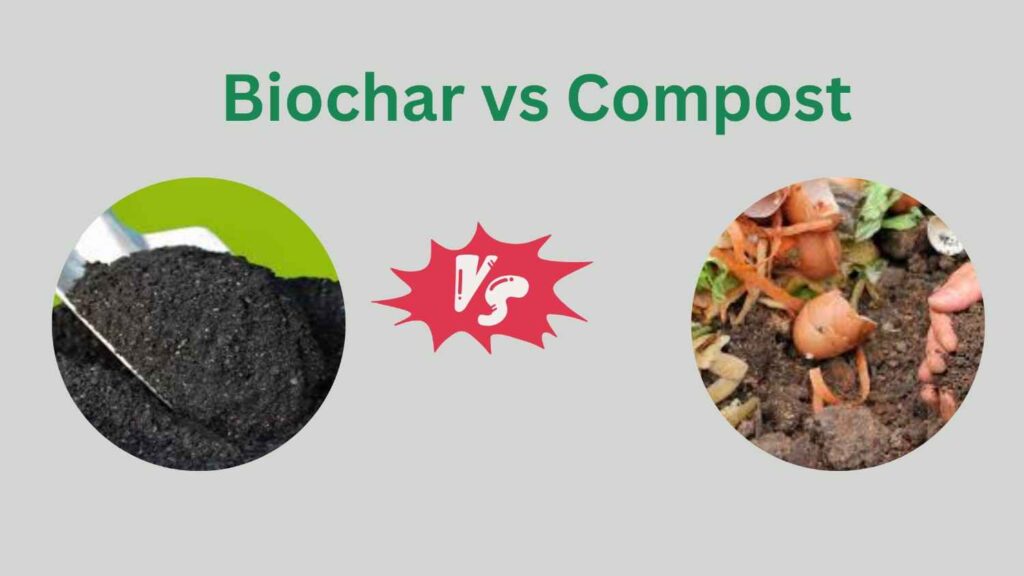If you love gardening, you’ve probably heard about compost and biochar. Both are popular for boosting soil health and helping plants grow strong. But here’s the big question: which one is better for your garden?
Well, the truth is, it’s not really a fight between the two. Compost and biochar are more like teammates than rivals. On their own, each has great benefits. But when used together, they can turn ordinary soil into a super-healthy, plant-loving home.

What is Compost?
Compost is like nature’s recycling system. You take food scraps, yard waste, and dead leaves and let tiny helpers—like bacteria, fungi, and worms—break them down. Over time, all this waste turns into dark, crumbly compost that smells like fresh soil.
Making compost is pretty easy at home. All you need is a mix of:
- “Browns” (dry leaves, paper, twigs)
- “Greens” (grass clippings, veggie scraps, coffee grounds)
- A little water and plenty of air
In a few months (sometimes longer), you’ll have rich compost to spread in your garden. Not only does it improve soil, it also keeps food waste out of landfills (where it would otherwise release harmful gases like methane).
What is Biochar?
Biochar is different. It looks like charcoal, but it’s made with a special purpose—to help soil for hundreds, even thousands, of years.
Biochar is created by heating organic material (like wood chips or crop waste) at very high temperatures in a low-oxygen environment. This process is called pyrolysis. Instead of burning up, the material turns into a stable, carbon-rich sponge.
Why is it special? Because biochar doesn’t break down quickly like compost. Once added to soil, it stays there for centuries, storing carbon safely underground and creating millions of tiny pores. Those pores work like a five-star hotel for soil microbes, giving them places to live and grow.
Unlike compost, though, making biochar at home isn’t a good idea. It requires very high heat and special equipment. Most gardeners buy biochar from trusted suppliers to make sure it’s safe and effective.
Biochar vs. Compost
| Characteristic | Compost | Biochar | When You Use Both Together |
|---|---|---|---|
| Nutrient Content | Full of goodies like nitrogen, phosphorus, and potassium. Feeds plants right away. | Not much plant food on its own. Acts more like a “nutrient locker,” holding food for later use. | Best combo: compost gives instant plant food, biochar stores it for the long haul. |
| Soil Structure | Works like glue, holding soil together. Loosens heavy clay and prevents erosion. | Like a sponge full of air holes. Helps water soak in, keeps sandy soils from drying too fast. | Compost glues soil; biochar adds air pockets. Together, soil gets the perfect balance of air, water, and strength. |
| Longevity in Soil | Breaks down in months or a year. Needs to be added regularly. | Super stable. Lasts for decades, even centuries. One-time use is enough. | Compost brings short-term energy, biochar provides a long-term foundation. |
| Carbon Storage | Stores carbon for a short while, but releases it back when it breaks down. | Excellent at locking away carbon for hundreds of years. | Together they cut waste, lower emissions, and build a lasting “carbon bank.” |
| Microbe Habitat | Feeds soil microbes—tiny helpers that protect roots and boost plant growth. | Like a luxury hotel for microbes; gives them safe, comfy homes. | Compost feeds microbes, biochar houses them. A happy, active underground community! |
| Application Frequency | Needs reapplying every year or so to keep soil healthy. | Apply once; it stays for ages. More isn’t always better. | Compost gives nutrients each season, biochar stays put as a strong soil partner. |
Compost + Biochar
Here’s the secret: you don’t actually have to pick between them. In fact, they work best together.
When you mix biochar into your compost pile, it helps good microbes grow faster, prevents nutrient loss, and makes composting quicker. By the time you spread it in your garden, the biochar is “charged” with nutrients—so your plants don’t face any short-term hunger.
Studies in U.S. farms and gardens show that adding both together can:
- Reduce fertilizer use by up to 30–40%
- Increase crop yields
- Improve soil water-holding during droughts
- Strengthen root systems and microbial life
A good rule of thumb for home gardeners is a 1:10 ratio of biochar to compost. Simple, balanced, and super effective.
Which One Should You Choose?
- If your soil is hungry for quick nutrients, compost is your best friend.
- If your soil is tired, sandy, or heavy clay, biochar can make a huge difference in structure and water balance.
- But if you want the best of both worlds, try using them together—you’ll get instant results from compost and long-term benefits from biochar.
